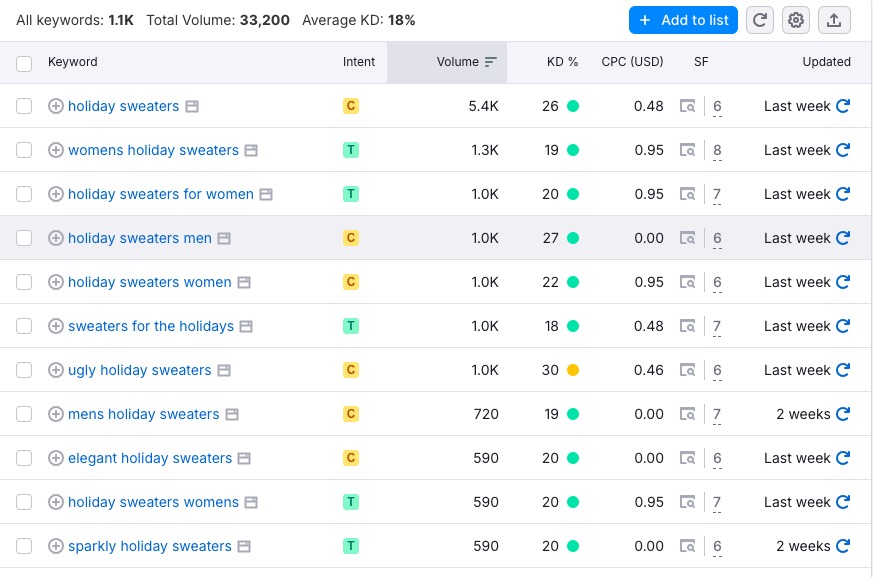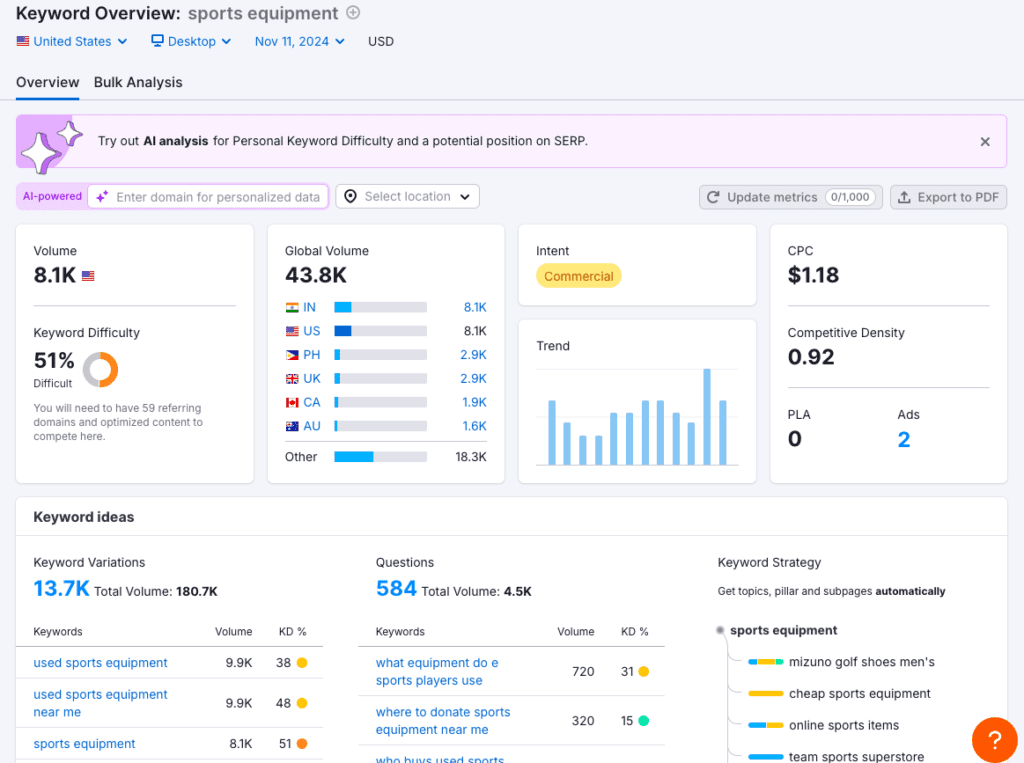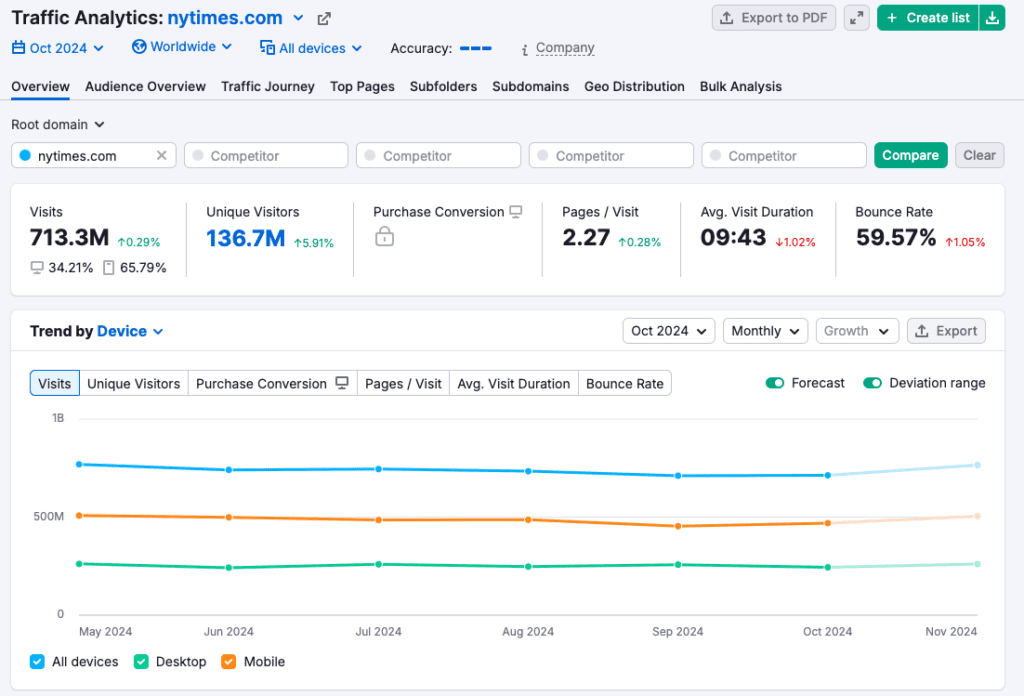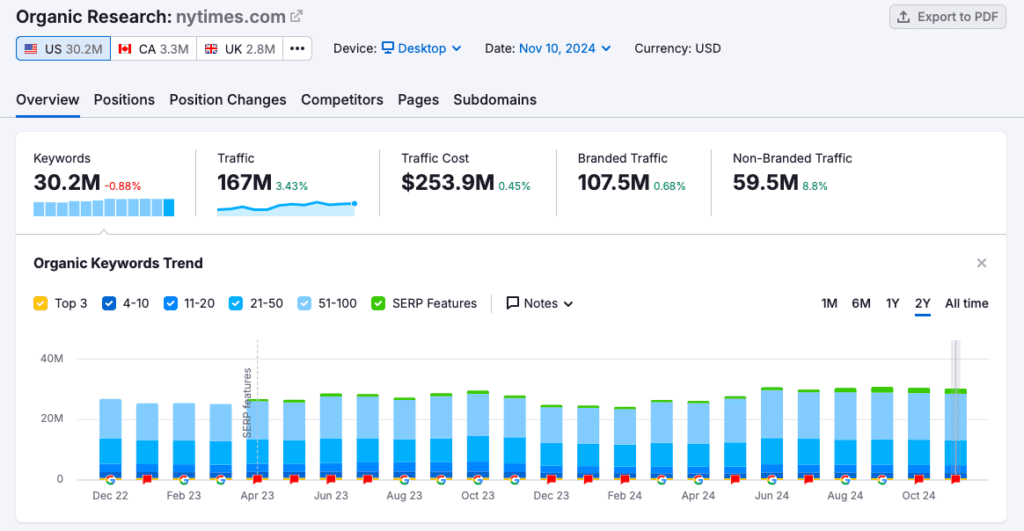SEMrush is among the most popular SEO tools in the digital marketing industry, known for its wide range of functionalities, from keyword research and competitive analysis to traffic analytics and content planning. SEMrush helps users research keywords by providing comprehensive overviews, including metrics like global and country-specific volume, keyword difficulty, and the ability to filter and cluster keywords effectively. But with so many metrics and features, a key question arises: how accurate is SEMrush? To answer this, we’ll explore SEMrush’s strengths, its methods for gathering and interpreting data, and offer practical tips for marketers looking to leverage this tool effectively.
Whether you’re analyzing search volume, keyword difficulty, or organic traffic, knowing the limitations and strengths of SEMrush will help you make the most of this powerful SEO tool.
Understanding SEMrush Accuracy
SEMrush accuracy is a crucial aspect of digital marketing, as it directly impacts the effectiveness of online campaigns. Understanding the factors that affect SEMrush accuracy can help marketers make informed decisions and optimize their strategies.
What Affects SEMrush Accuracy?
Several factors can influence SEMrush accuracy, including:
- Data Sources: SEMrush relies on a combination of machine learning and third-party data to estimate keyword metrics. The accuracy of these data sources can impact the overall accuracy of SEMrush.
- Algorithm Updates: Google’s algorithm updates can affect SEMrush’s ability to accurately estimate keyword metrics. SEMrush may need time to adjust to these updates, which can impact accuracy.
- Keyword Research: The quality of keyword research can impact SEMrush accuracy. Using relevant and high-quality keywords can improve accuracy, while using low-quality keywords can lead to inaccuracies.
- Competitive Analysis: SEMrush’s competitive analysis tool can be affected by the quality of data from competitors. If competitors’ data is inaccurate or incomplete, SEMrush’s competitive analysis may also be inaccurate.
- Search Volume: SEMrush’s accuracy can be impacted by search volume. If search volume is low, SEMrush may struggle to provide accurate estimates.

Understanding SEMrush Data Sources
SEMrush uses a combination of data sources to estimate keyword metrics, including:
- Machine Learning: SEMrush uses machine learning algorithms to analyze data and estimate keyword metrics.
- Third-Party Data: SEMrush relies on third-party data providers to gather information on keyword metrics.
- Public APIs: SEMrush uses public APIs to collect data on social media and online advertising.
- Backlink Crawler: SEMrush’s own backlink crawler collects data on backlinks and referring domains.
By understanding the factors that affect SEMrush accuracy and the data sources used by SEMrush, marketers can make informed decisions and optimize their digital marketing strategies.
How Accurate is SEMrush in Keyword Research?
Understanding SEMrush’s Keyword Research Capabilities
Keyword research is a foundational feature of SEMrush, offering tools like the Keyword Magic Tool and Keyword Gap Tool. These tools enable marketers to explore keyword volume, keyword ideas, keyword difficulty, and more, helping shape targeted digital marketing strategies. SEMrush allows users to research keywords by analyzing and evaluating the potential of various keywords through its tools.
Analyzing Keyword Volume and Keyword Difficulty
SEMrush calculates keyword volume and keyword difficulty using various data sources, including clickstream data and third-party data. Search volume reflects the number of times users search for a particular keyword, while keyword difficulty estimates how challenging it might be to rank for a given keyword. While these metrics are highly informative, it’s essential to remember they are estimations.
Tips for Verifying Keyword Data Accuracy
To enhance keyword research accuracy, it’s wise to compare SEMrush’s data with Google Search Console and other SEO tools like Ahrefs or Moz. For example, Google Search Console can provide a clearer picture of your actual search traffic and organic performance for specific queries.
SEMrush’s Accuracy in Traffic Estimations
How SEMrush Estimates Website Traffic
One of SEMrush’s unique features is its Traffic Analytics tool, which provides estimated data for website’s traffic, traffic distribution, and traffic sources. This feature is especially useful for competitive research, allowing marketers to gain insights into competitors’ performance and competitors’ rank.
Traffic Estimation Limitations
SEMrush’s traffic estimations are generated through machine learning algorithms and third-party data sources, which include clickstream data and referring domains information. While SEMrush is often accurate for larger sites, traffic estimations for smaller websites or niche industries may vary. Cross-referencing this data with your own Google Analytics metrics can provide a clearer, more customized view of your website’s visibility.

Tips for Effective Competitive Analysis
When performing a competitive analysis, use SEMrush’s Competitive Intelligence tools to assess traffic analytics for both organic traffic and paid ads. This approach provides a more balanced view of your competitor’s growth trajectory and performance across various channels, helping you make informed decisions.
How SEMrush Compares with Google Search Console for Search Data
Google Search Console vs. SEMrush: An In-depth Comparison
While SEMrush is a fantastic SEO tool for competitive intelligence and industry-wide research, Google Search Console offers direct search data from your website. This tool can be especially useful for small websites or specific landing pages that SEMrush may not fully capture.
Search Volume and Keyword Rankings
Google Search Console’s search volumes for keywords and actual rankings give precise insights into how your website is performing in search results. While SEMrush provides estimates based on broader data, Google Search Console shows your real organic traffic and exact search traffic sources.
How to Blend SEMrush and Google Search Console Insights
For the best results, combine SEMrush’s competitive data with Google Search Console’s precise performance metrics. This approach allows you to monitor your website’s traffic trends against industry standards, giving you both high-level and granular insights.
Using Keyword Difficulty Scores for Strategic Advantage
What SEMrush’s Keyword Difficulty Tells You
Keyword difficulty is one of SEMrush’s core metrics for helping marketers understand how competitive a keyword may be. By analyzing factors such as backlinks, page authority, and search volume, SEMrush estimates how challenging it will be to rank for a keyword.

Cross-Referencing with Other Tools
It’s worth comparing keyword difficulty scores from SEMrush with similar metrics from Ahrefs or Moz. This comparison allows you to see a broader perspective on search data and tailor your strategy for more highly relevant keywords.
Practical Tips for In-depth Keyword Research
For a competitive analysis, SEMrush’s keyword difficulty scores can be a valuable indicator of growth trajectory potential. Use this metric to prioritize keywords in your strategy, focusing on terms that balance search volume and difficulty to target achievable rankings.
Advantages and Limitations of SEMrush’s Competitive Analysis Tools
Competitive Analysis with SEMrush
SEMrush provides powerful features for competitor analysis, from traffic analytics and keyword gap tool to referring domains and content marketing insights. These features help businesses gain a well-rounded view of their competitors’ digital marketing strategies.
Strengths of SEMrush for Competitor Intelligence
With tools like Traffic Analytics and Keyword Gap Tool, SEMrush offers insights into competitors’ performance, their best keywords, and their traffic distribution. This is invaluable for marketers looking to expand their online business by understanding where competitors rank.
When to Supplement SEMrush Data with Google Ads
For businesses involved in paid ads, consider using Google Ads alongside SEMrush to compare search traffic and keyword insights. While SEMrush estimates how much traffic a keyword can generate, Google Ads provides a practical budget estimation for each given keyword.
Tips for Getting the Most Accurate SEMrush Data
Use Multiple SEO Tools for Balanced Data
To achieve the best results, combine SEMrush’s data with Google Search Console, Google Ads, and even Ahrefs when analyzing organic traffic and keyword research. This cross-verification can give you more accurate data across different digital marketing channels.
Adjust for Niche Industries and Specific Sites
For smaller websites or niche industries, SEMrush shows broader data, which may not be as pinpointed. Using Google Search Console and Google Ads for these specialized websites can help fine-tune your understanding of search volumes and traffic analytics.

Focus on Competitive Intelligence and Long-term Strategy
SEMrush is a perfect tool for tracking website’s visibility, understanding competitors’ performance, and creating a sustainable growth trajectory for your business. Focus on tracking metrics like traffic distribution and referring domains to gain a strategic advantage in the market.
Final Thoughts on SEMrush’s Accuracy for SEO and Competitive Analysis
SEMrush is a leading SEO tool for marketers and businesses looking to develop effective digital marketing strategies. While SEMrush provides an array of accurate data on keyword difficulty, search volume, and competitive analysis, its metrics are most valuable when used alongside Google Search Console and other popular SEO tools.
When considering how accurate is SEMrush, remember it offers a comprehensive view of your industry, though Google’s data and direct analytics will always provide more specific insights for your website. By blending SEMrush with other tools, you can make better-informed decisions to optimize your organic traffic, improve content marketing strategies, and stay ahead in the competitive landscape.
Schedule a free consultation with Elevato for all your SEO needs!
